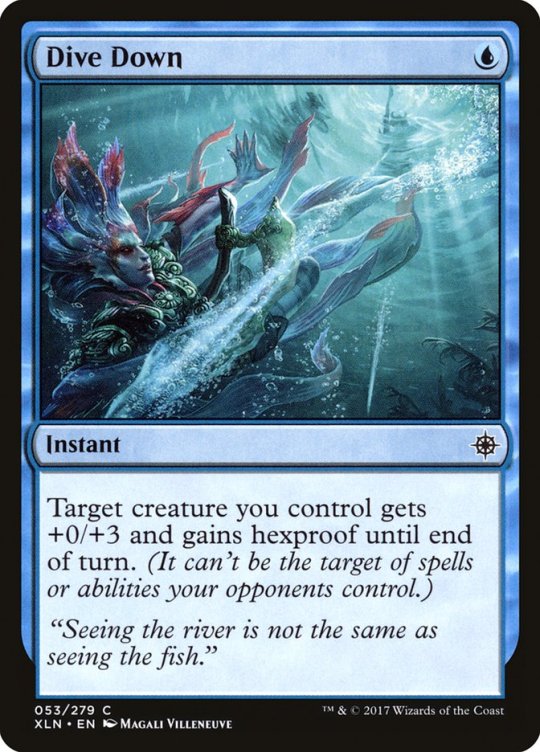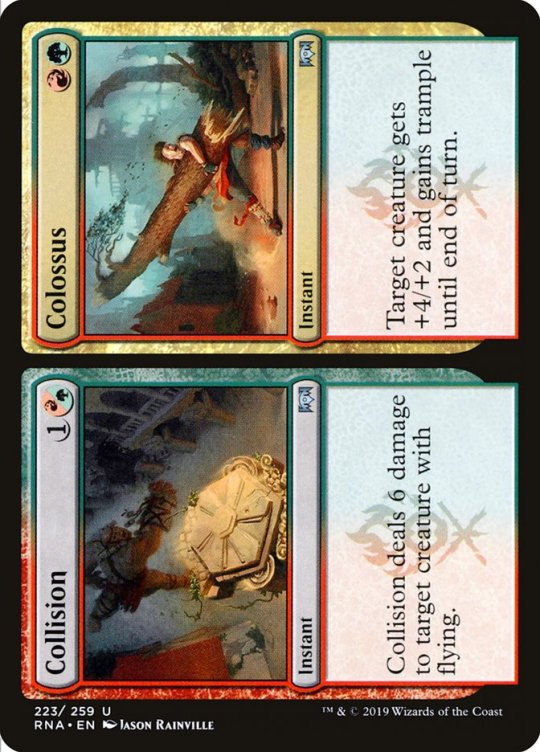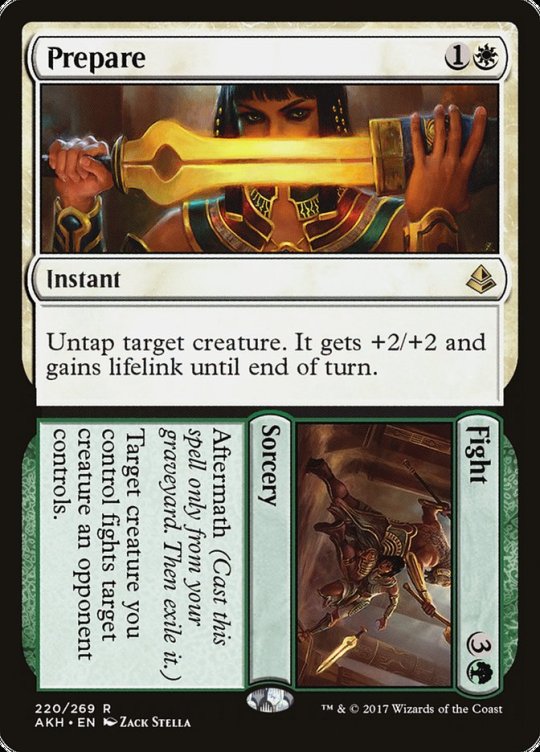#one quick trip to the wiki to read its lore and i had the perfect name
Explore tagged Tumblr posts
Note
You're more amazing than flooding
Big fat combat trick to pump all your excess mana into!

Cards used as example for balancing the modes:



#asks#custom cards#a little bit worried about the red + white mode#+7 power + trample + lifelink is. a lot#but it costs 6 mana so it might be fine#probably not even good enough to be a modern rare anyway#anyway finding comparisons for balancing was kinda hard#i'm not entirely sure how spree is balanced but i tried costing each mode like an individual spell#the drawback is that you have to pay 1 more mana but the benefit is the versatility and ability to cast multiple modes#so i think it balances out#couldn't quite find perfect comparisons for the red and white modes#Colossus is multicolor but it's also a modal spell so i think red could maybe probably get +4/+2 and trample for 2 mana#Prepare gives +2/+2 for 2 mana and scaling up makes the lifegain stronger but also less flexible for untapping so i think it's fine#plus Prepare has Fight as an aftermath#another comparison is Butcher's Glee which gives +3/+0 and lifelink and regenerate for 3 mana#regenerate is basically indestructible so that's even better than +3 toughness so that kinda makes up for the lack of untapping#overall i THINK each mode is balanced as a standalone spell and that's kinda sorta how some spree spells are balanced so i think it's fine#rare spree spells like Three Steps Ahead have some modes that would be too strong as a normal spell. 2 mana to counter any spell is strong#and the other modes (2 mana to draw 2 discard 1 and 3 mana to make a copy of a creature) are still reasonable as standalone spells#so i think the balancing of my spell is fine and maybe even a little underpowered for a rare#i had no idea what to name it at first so i started thinking about jeskai (both the clan and the color trio) and remembered Hinata#a jeskai legend that wants you to target stuff! perfect!#one quick trip to the wiki to read its lore and i had the perfect name#this was made for the inventor's fair contest this week to make a card that can target multiple things#and boy do i love targeting things! so i came up with this unique little idea that fits both my tastes and the contest perfectly!#i'd be surprised if no one else references Hinata in their cards#oh yeah i wanted all the modes to be different sizes so that's why i insisted on the white mode being big#made this yesterday and looking at it again today i'm still satisfied with it so i think i'll submit it
0 notes
Text
Quick Critique: Steamworld Dig 2
Steamworld Dig 1 was a neat game with a pretty unique take the exploration genre. It combined the exploration and upgrading of the usual fare with some platforming challenges and paid off with short bursts of the kind of happiness you get from clicker games. Heist didn't interest me, so I was happy to see Image & Form revisit the Dig world. Dig 2 is a lot of tweaking and updating what Dig 1 started but some of the changes are great, some don't really create meaningful differences, and others bring the game down a bit. You play as Dot this time and she levels up by killing enemies rather than gaining resources. Leveling up is still a way to gate high level upgrades but this time, it also gets Dot a bonus on how much she can sell resources for. I'm jumping ahead a bit, but while this sounds good, it's actually a major annoyance. Unless you seem to spec out for all the money skills and grind out levels before you cash out digs, there aren't enough resources to get all the upgrades. I beat the game without dying and collected every resource I could outside of a handful that got destroyed in enemy chain reaction explosions leading to the resource being crushed or fall into a pit and I have a few upgrades I still can't afford and I'm not at the level cap. In Dig 1, if you play the game well, you finish it was a lot of extra cash and a few dozen extra Orbs. In Dig 2, as soon as you find some enemies that pay out decent XP, spend a bunch of time farming them to boost your levels and get the sale bonuses early and then spend all your money and upgrade points on the abilities that lead to extra money or else you're going to come up short. A huge appeal of exploration games is unlocking new abilities and maxing out your character, so coming up so short here is a huge letdown. I could understand that if you played sloppy, died and lost resources, or didn't go back to clean out old caves, but for a player invested in the game, that's just misguided construction. I actually started a second save file and bought the upgrades that grant more money and farmed a bunch of levels to get my sales bonus up before collecting resources, and I was swimming in extra cash by the end of the game. So that definitely looks like the intended way to play or somebody just didn't check their numbers/balancing for players that want to play with the fun upgrades rather than the money ones or that explore the mines early rather than only doing a clean up late in the game. Beyond the actual number balancing, Dig 2 has a much more robust upgrade system. Instead of using Orbs to just buy new parts like Dig 1, Dot can find "Cogs" to unlock new skills and abilities for items you've bought/unlocked, and some of them can majorly change how you play. You also aren't locked into what you spend them on and you can respec any time you return to town, so finding Cogs becomes a huge reward. The ability unlocking is also sped up to get you back to where you were when you finished up Dig 1. One of the earliest skills you get allows you to hit blocks above you or at a distance, like Rusty's rocket punch, and you eventually unlock the ability to fire that while in the air, which is a major game changer. The control scheme has also been greatly improved, so there's a lot less fiddling around to swap equipped items because they removed the consumable items.
Dig 2 has a lot of nice quality of life improvements. Your water and life automatically fill up when you return to town, so there's no needless farming of easy enemies to get back to full health. The map ticks off caves if you've found every secret in them so it's a bit friendlier for doing the end game cleanup than Dig 1 was. The map has a guiding arrow to point you to the next objective too. You have the option to turn it off but I left it on to see where NOT to go so I could explore more. I get oddly stressed out in games when I accidentally progress the story before I've had a chance to look all over, so having the arrow was a nice way for me create a lot of mini points-of-no-return and play how I like to. There are a lot more little things to find while exploring, which means more secrets as rewards for exploring and then more upgrades as you cash in the items you find squirreled away in odd spots. A couple of them are kiiind of BS in the way they're hidden though. It even has a nice touch where when you go to quit the game, it gives you the standard warning that any unsaved information will be lost, but then it actually displays a timer for when the last autosave was. It's small things like that that let you know this game was made by people that care
While a lot of the quality of life work has been improved, I'm not sure if I like Dig 2 better than 1. Dot isn't as "neat" as Rusty as a protagonist. Rusty's design is exactly what you want from a steam-powered Wild West explorin' and diggin' old timey robot. Dot is too humanoid. There's also a character that looks like a more bulked up version of Cronenberg dimension Summer from Rick and Morty and it bugged me every time I saw her. Can't really fault the game team for that one, but just know... that's there. I found the ending of Dig 1 to be super disappointing and Dig 2 doesn't really do much to redeem it, so Dot and Rusty's stories don't really come together in great ways. Seeing what Rusty was up to between Dig 1 and 2 seems like it's far more interesting than what Dot experiences. Steamworld Heist wasn't my thing, but I appreciate how the games all tie together. It's not in your face, but you'll appreciate some minor things more if you know their other games (or just read a wiki page) and Dig 2 connects the "lore" together in a fun way.
The combat still sucks. There's no way around that. Fighting enemies in these games is not fun and when you reach the boss that can teleport around the arena while spamming projectiles, the combat just feels shoehorned in because games "must" have combat. The final boss is absolutely lousy due to this. Dig 1's final boss felt more puzzle-y than action-y and that's what made it work in a game that wasn't super fighting focused. Rusty had an objective while a thing was fighting him. Dot has a combat experience that feels like it was taken from a rather different, and much worse, game. Heck, the post game content is also super lousy. It's such a massive disappointment that the game closes with such awful moments. They run so counter to everything that made the game fun that it's baffling that a team that could make a game so good would sully it by adding such awful, awful segments. They're moments built around having you fight with the worst of the game's controls and combat problems so it's shining an extremely bright spotlight on combat that's awful, chase sequences that kind of just come down to luck unless you come equipped with specific abilities that you weren't warned about and that weren't needed in the main game, and bad platforming/camera combinations. And just to twist the knife even more, it has a Portal "cake" reference. It's hard to even know how to react to that in 2017. Anger seems to have washed over, so I guess we're just up to despair on "the cake was a lie" references.
I've tried to avoid specifically mentioning specific game elements because in an exploration game, that's pretty close to being the only thing you can spoil, but I do feel the need to talk about two new upgrades and how they change the game from Dig 1. For the good side, you eventually get a hookshot in this game. And it's awesome. It's the perfect natural progression from Rusty's abilities. It lets you zip around the mines and creates some really fun challenge rooms and for some reason you can negate fall damage by grappling to the floor right before you smash into the ground. Hookshots are so awesome they defy physics. For the bad side, you shortly earn another mobility-based upgrade and it all but completely negates every other mobility ability. From that point on, challenges are focused on using that one power and the mines are built for navigating with it. It's so overpowering while not delivering any of the fun of a double jump or hookshot, that kind of ruins the back end of the game. You even get an upgrade that removes any skill or challenge in making sure you don't overuse your power, so the end of the game is just you using that one thing to solve any issue and ignoring all your other abilities.
Much like Dig 1, your enjoyment for Dig 2 will be heavily dependent on how laid back you're willing to have the game be. There's a despondent zen to the Dig games as you go alone into a mine, slowly break away at blocks to get deeper while your light burns away, and you head back through your path to leave the mine barely having gotten any further and barely having made any money but knowing that your next trip in will be that touch easier. Most exploration games ramp up the power fantasy as you gain amazing new powers and strength, but the Dig games are more chill than that. You unlock tools that allow you to progress but it's not until late in the game that you feel any sense of power. But that's what makes them interesting and fun. Steamworld is almost depressing with the state of the land, the townsfolk and their issues, and even the music, but it's never a slog. I appreciated its downer nature right up until I got those final upgrades that changed the whole feel of the game. Dig 2's jump to a $20 price tag just isn't worth it. The game is very short and features a lot of padding on the back end, so unless you want to find 100% of everything, it's going to be a brisk experience. That was fine with Dig 1 where the game was half the price, but Dig 2 suffers for it. If you do want to 100% everything, prepare for a lot of backtracking and grinding, which may sour you by the time the credits roll. It's rough to say, but Dig 1 and Heist go on sale seemingly every month, so maybe wait for Dig 2 to do the same. I had a gift card with store credit sitting around, so I'm not upset about the purchase, but I'd have been more willing to overlook the problems in the last act of the game on a cheaper and shorter but tighter game.
0 notes